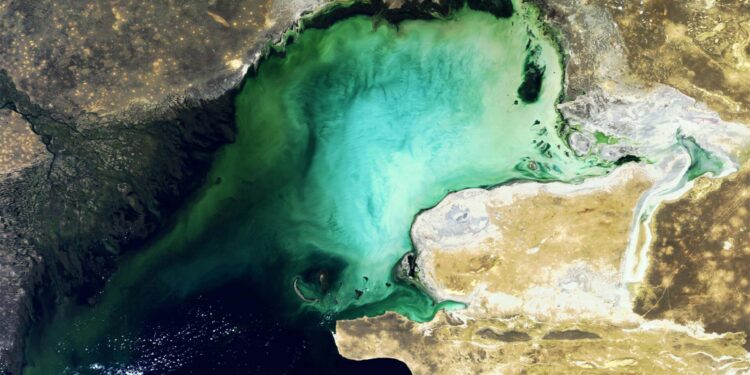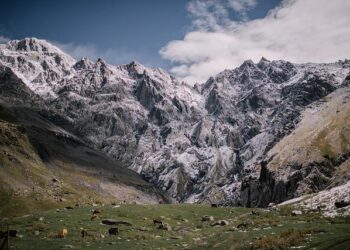As the Caspian Sea continues to shrink at an alarming rate, Azerbaijani experts are raising urgent concerns over the escalating risks to the region’s tourism industry as well as its unique flora and fauna. The dramatic decline in water levels threatens not only the delicate ecosystems that depend on the sea but also the economic livelihoods tied to nature-based tourism along its shores. This emerging environmental crisis calls for immediate attention and coordinated action to safeguard the Caspian’s biodiversity and the communities that rely on it.
Caspian Sea Shrinkage Threatens Regional Tourism and Biodiversity
The rapid decline of the Caspian Sea’s water level is causing alarm among Azerbaijani specialists, who warn of profound repercussions not only for regional tourism but also for the delicate ecosystem that relies on this vital body of water. Shoreline retreats have led to the destruction of nesting grounds for indigenous bird species, while the shrinking wetlands threaten the survival of native flora and fauna. Local communities that depend on fishing and eco-tourism report significant economic setbacks, as reduced water volume limits access to popular recreational spots and curtails biodiversity that attracts visitors year-round.
Key areas of concern highlighted by experts include:
- Loss of critical habitats for migratory birds and endemic fish species
- Increased soil salinity, negatively impacting coastal plant life
- Decline in tourism revenues due to diminishing beach areas and water activities
- Heightened risk of desertification in surrounding regions
| Impact Area | Effect |
|---|---|
| Bird populations | Decrease in nesting success by 30% |
| Tourism revenue | Estimated drop of 25% in affected zones |
| Coastal vegetation | Significant dieback due to rising salinity |
Experts Warn of Alarming Declines in Flora and Fauna Populations
Azerbaijani environmental specialists have raised serious concerns regarding the rapid diminishment of the Caspian Sea, a phenomenon triggering cascading effects on the region’s biodiversity. This drastic shrinkage has led to habitat loss for numerous native species, with many plants and animals now facing an unprecedented survival crisis. Among the key challenges cited are:
- Decreased wetland areas critical for migratory birds and aquatic life
- Salinity changes disrupting breeding cycles of endemic fish species
- Vegetation decline threatening food sources and shelter for small mammals and insects
Observations indicate that several flora and fauna populations are not just dwindling but approaching alarming thresholds that could imperil the ecological balance in the Caspian basin. Local communities dependent on fishing and eco-tourism might also experience profound economic repercussions as biodiversity continues to erode.
| Species | Population Decline (%) | Primary Cause |
|---|---|---|
| Caspian Seal | 40 | Habitat Loss |
| Sturgeon Fish | 55 | Water Salinity Changes |
| Reed Grass | 35 | Wetland Reduction |
Calls for Urgent Conservation Measures and Sustainable Development Practices
Azerbaijani environmentalists and conservationists are raising alarms over the accelerating shrinkage of the Caspian Sea, emphasizing that immediate action is critical to safeguard the region’s unique biodiversity and tourism potential. They highlight that the rapid decline in water levels is disrupting delicate ecosystems, threatening endemic species of flora and fauna that have thrived along the Caspian coastline for centuries. The experts warn that without sustainable intervention, irreversible damage will occur, impacting not only wildlife but also the livelihoods of communities dependent on fishing and eco-tourism.
Among the key measures urged by specialists are:
- Implementation of stricter water management policies to curb excessive freshwater extraction
- Enhanced protection zones for critical habitats with restricted industrial activity
- Promotion of environmentally friendly tourism practices to reduce ecological footprints
- Investment in renewable energy to decrease pollution levels along the coasts
- Community engagement initiatives to foster local stewardship of natural resources
| Conservation Priority | Target Outcome | Projected Timeline |
|---|---|---|
| Wetland Restoration | Revive 30% of degraded wetlands | 5 years |
| Endangered Species Protection | Stabilize populations of native fish and birds | 3 years |
| Eco-tourism Development | Increase sustainable visitor numbers by 20% | 4 years |
The Conclusion
As the Caspian Sea continues to recede, Azerbaijani experts warn of mounting threats to the region’s delicate ecosystem and its burgeoning tourism industry. The shrinking waters not only endanger diverse flora and fauna but also pose significant challenges to local communities dependent on the sea for their livelihoods. Addressing these concerns requires urgent, coordinated efforts from government bodies, environmental organizations, and international partners to implement sustainable measures aimed at preserving this vital natural resource. Without swift action, the ecological and economic repercussions could be far-reaching, underscoring the critical need for comprehensive strategies to safeguard the future of the Caspian Sea and its surrounding environments.















